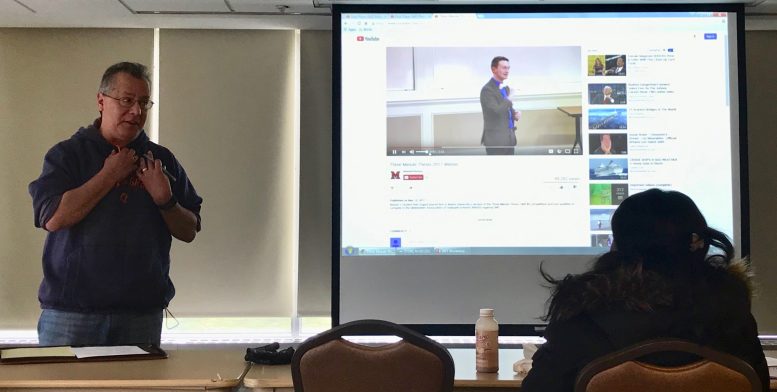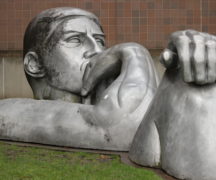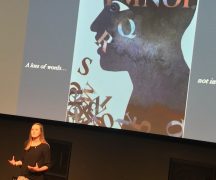By DAVID DUPONT
BG Independent News
Carren Burkey, a masters degree student in molecular biology, is studying the interaction between a particular pest and soybeans.
This is important work given the importance to soybeans on the world stage and locally. The campus is surrounded by bean fields.
Burkey would like to better express what she’s working on to people out in the field, as well as the general public.
That’s what brought her to an informational session on the Three Minute Thesis competition that will be held Feb. 7 at Bowling Green State University.
During the competition masters and doctoral students will get the chance to present their research, but they’ll have only three minutes to do it, and can only use one slide.
The goal is to explain their work to a general audience.
Graduate College Dean Peggy Booth said the competition began about a decade ago at the University of Queensland in New Zealand. “They started it and it’s been so popular and so effective that they copyrighted it.”
It has spread to the United States — Miami University and Kent State both stage competitions.
The Three Minute Thesis has been such a success, Booth wanted to bring it here.
The 3MT teaches students to condense their thesis or dissertation. That’s a valuable skill.
Sometimes perspective faculty members take a half-hour to explain their scholarship, she said.
They need to be able to explain that work in less time and to emphasize why their research matters.
The informational session held recently offered guidance on making their presentations.
Keith Ramsdell, the director of graduate enrollment who studied theater, offered some basics on presentation.
“I’m a layman,” he said.”I want to come and learn about your topic”and the best way to do that is for the scholar to “make it fun and engaging.”
Drawing on suggestions from the 3MT website, he offered advice on how to accomplish that.
“Avoid jargon and academic language” topped the list.
He also said to imagine telling fellow student or a friend, and don’t be afraid to frame the research as a story and draw on personal experience to humanize the subject.
Most of all, he said, “convey your excitement and enthusiasm.”
Ramsdell also advised students to be careful not to overload their one slide, which must be static, with information.
The goal, Ramsdell said, is to leave the listener with a clear understanding about the work and why its matters.
Alberto Gonzalez, a Distinguished Professor of Communications Studies, offered his advice on demeanor. Use hands affectively, he said, but be careful of nervous gestures that distract the listener.
Be confident, he said. “You want to be perceived by the audience as a credible researcher.”
“Even if you don’t win the prize,” Gonzalez said, “you’ll learn so much about the presentation process.”
The winners will receive cash prizes up to $300. They may also move on to a regional competition. A panel of faculty members will judge event.
More than a dozen graduate students have already signed up.
Burkey said she wants to more experience communicating to those outside the field.
She may need it later when she is seeking grants or the support of politicians.
Kacie Pummill, who studies communications disorders, said 3MT will “force me to develop an elevator pitch.”
Pummill is looking at people who are suffering from aphasia following a stroke. They have a hard time understanding language and expressing themselves, she said. She’s looking at what particular problems occur most often as a way of improving therapy.
She sees the event as a way to spread awareness of the problem and the research into addressing it.
Booth said the 3MT will be presented in the that in the student union. The timing will be determined by how many sign up to participate.




